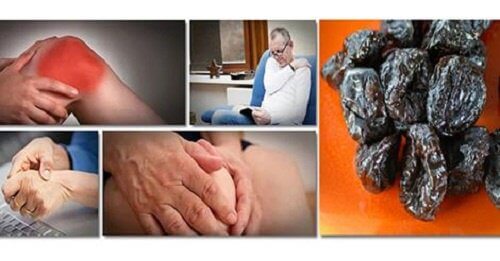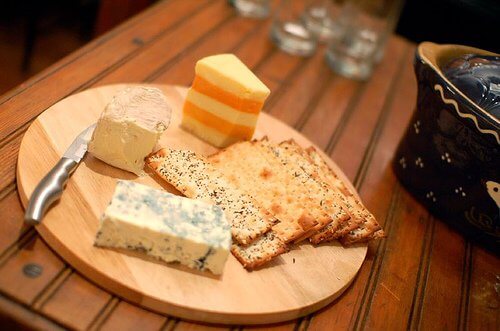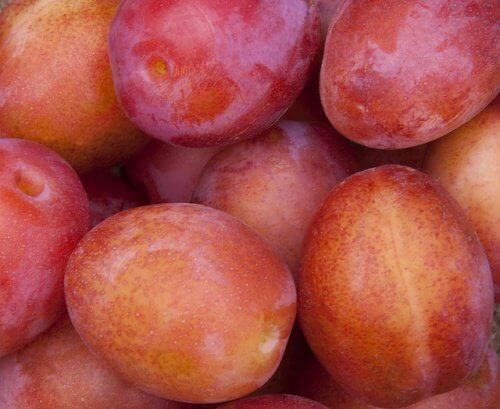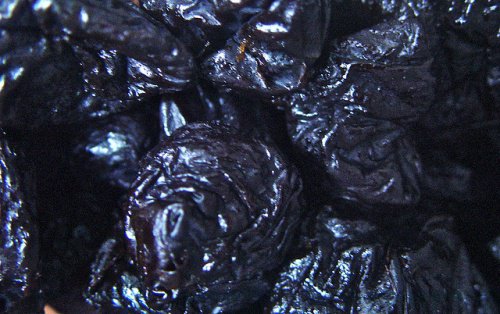The Prune May be Able to Prevent Bone Mass Loss

People are always saying that the best way to keep your bones healthy is to consume lots of calcium, and that the best way to get calcium is to drink milk and consume other dairy products. Is this assumption correct? In the following article, we’ll explain another perspective on calcium, and suggest another food with huge benefits for bone health: the prune.
Also Read: Non-Dairy Foods Rich in Calcium
The truth about calcium
When we talk about bone problems, such as osteoporosis, we are generally flooded with facts about how good calcium is for your bones. And while it may be true that this mineral is crucial to our health, there are other minerals that are equally important because they help our bodies absorb that calcium. That’s why your first step shouldn’t be to go running to foods with added calcium, but to eat a balanced diet, choosing different foods that provide the calcium and other nutrients that your body needs. The prune is one of these foods.

Acidification
You’ve probably heard that your body can have an acidic or alkaline pH, and that most of us generally lean toward the acidic side because of poor eating habits (like consuming sugars, fried foods and refined sugars), other vices (such as smoking and consuming alcohol), negative emotions, stress and pollution.
Well, this excess acidity causes your body to steal calcium from your bones, eliminating it through the urine in an attempt to balance your pH.
This is where we see the first benefit of the prune: prunes are great for alkalizing pH.
The prune has other nutrients as well
Prunes are also rich in potassium, magnesium, boron, copper, and iron, as well as vitamins A and K, indispensable nutrients when it comes to bone health and preventing the loss of bone mass. Strangely enough, they do not have any calcium, but a number of research studies have shown that eating prunes on a daily basis can decrease your risk of suffering from bone diseases.
See Also: Foods that Provide the Most Potassium
Prunes (or even fresh plums) are nutritious and great for preventing constipation, which is why you should try eating a few each morning.

How should I eat them?
The healthiest way to eat prunes is to soak them overnight in half a cup of water. Eat them on an empty stomach the next morning, and also drink the remaining water.
Ideally, you should eat between 3 and 5 prunes per day.
If the idea of eating prunes doesn’t sound appetizing to you, you can also mix them with other ripe fruits or vegetables. You can also incorporate them into breads or cakes; their sweet juiciness will help replace some of the sugar in your favorite recipe.

Complete your diet
You should also try out some of these equally beneficial foods, which are great for bone health thanks to their high vitamin and mineral content, especially calcium, and which are easier to absorb than dairy products or foods with added calcium:
- Sesame: This product has more calcium than milk and is much easier to absorb. You can eat raw sesame seeds, or try eating sesame as gomashio (ground sesame seeds toasted with salt), sesame oil, or tahini (sesame paste). You can also mix tahini with water, lemon, cinnamon and honey for a delicious sesame beverage.
- Maca: This food has tons of calcium and iron, and is great for keeping your hormones balanced. People with uncontrolled hypertension or a sensitive immune system should read up on maca before taking it.
- Cooked carrots: They have a much higher calcium content when cooked than when raw.
- Saltwater: A natural supplement with a number of benefits that can be found in natural food shops. We recommend taking one tablespoon before each meal.
A smoothie for your bones
Try this delicious recipe that makes extensive use of the prune to strengthen your bones.
- Mix one tablespoon of sesame seeds with a cup of water in a blender for at least one minute.
- Strain the resulting sesame milk and remove the fiber (which you can use for another recipe).
- Pour the milk back into the blender and mix it with three previously soaked prunes.
- Add a bit of cinnamon.
That’s all you need to do for your smoothie, which is a delicious breakfast or snack option that will keep you and your family healthy.
All cited sources were thoroughly reviewed by our team to ensure their quality, reliability, currency, and validity. The bibliography of this article was considered reliable and of academic or scientific accuracy.
Hooshmand, S., Chai, S. C., Saadat, R. L., Payton, M. E., Brummel-Smith, K., & Arjmandi, B. H. (2011). Comparative effects of dried plum and dried apple on bone in postmenopausal women. British Journal of Nutrition. https://doi.org/10.1017/S000711451100119X
Stacewicz-Sapuntzakis, M., Bowen, P. E., Hussain, E. A., Damayanti-Wood, B. I., & Farnsworth, N. R. (2001). Chemical composition and potential health effects of prunes: A functional food? Critical Reviews in Food Science and Nutrition. https://doi.org/10.1080/20014091091814
Sacco, S. M., Power, K. A., Chen, J., Ward, W. E., & Thompson, L. U. (2007). Interaction of sesame seed and tamoxifen on tumor growth and bone health in athymic mice. Experimental Biology and Medicine (Maywood, N.J.). https://doi.org/10.1007/s001010050971
Liu, H., Jin, W., Fu, C., Dai, P., Yu, Y., Huo, Q., & Yu, L. (2015). Discovering anti-osteoporosis constituents of maca (Lepidium meyenii) by combined virtual screening and activity verification. Food Research International. https://doi.org/10.1016/j.foodres.2015.06.028
Lee, S. W., Kim, B. K., & Han, J. A. (2018). Physical and functional properties of carrots differently cooked within the same hardness-range. LWT. https://doi.org/10.1016/j.lwt.2018.03.055
Attaluri, A., Donahoe, R., Valestin, J., Brown, K., & Rao, S. S. C. (2011). Randomised clinical trial: Dried plums (prunes) vs. psyllium for constipation. Alimentary Pharmacology and Therapeutics. https://doi.org/10.1111/j.1365-2036.2011.04594.x
This text is provided for informational purposes only and does not replace consultation with a professional. If in doubt, consult your specialist.








